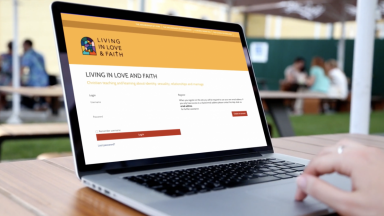
Church of England General Synod members meeting in York have been taking part in group discussions on marriage, sexuality and gender identity as part of the Living in Love and Faith (LLF) "discernment process".
The LLF Next Steps Group of nine bishops chaired by the Bishop of London, Sarah Mullally, circulated a paper to Synod members outlining the aim of the hour-long group work on Sunday afternoon.
It was for "members of Synod to engage with each other and the subject matter of LLF in a way that sows the seeds of deeper mutual understanding that will cultivate hopeful and gracious discernment and decision-making in February 2023".
Synod members met in 30 groups of around 15 people, each with a facilitator. There was no plenary discussion or debate of the controversial issues around LLF at the July Synod.
But the deep divisions in the CofE on sexual morality were evident at the two question and answer sessions on the Friday and Saturday evenings during which Synod members asked supplementary questions to the ones they had submitted in writing to bishops and officials before the meeting.
In a written question to Bishop Mullally, Alexander Berry, a lay member for Leeds Diocese, asked: "The House of (diocesan) Bishops has rightly publicly declared that the Church is institutionally racist. Will the House of Bishops now begin a similar process - possibly including a report - to discern whether the Church is institutionally homophobic?"
Bishop Mullally replied: "As you know, questions of sexuality are being considered by the Church – including the House of Bishops and members of General Synod – by means of the LLF process.
"Were a process similar to the Racial Justice Commission to be initiated, that would need to emerge as an outcome of the discernment and decision-making stage of the LLF process which begins in September 2022 and will come to a clear sense of direction in February 2023."
Before the meeting, Synod members were told about a new Pastoral Consultation Group to support LGBT clergy and laity.
The Next Steps Group said: "The aim of the Pastoral Consultative Group is to support and advise dioceses on pastoral responses to circumstances that arise concerning LGBTI+ clergy, ordinands, lay leaders and the lay people in their care. The membership and Terms of Reference for this group have not yet been established."
In September 2022, the CofE's College of Bishops, which includes the Archbishops of Canterbury and York and 106 diocesan and suffragan or area bishops, is due to meet for the first of three residential meetings "almost wholly devoted to LLF".
The Next Steps Group told Synod members: "Bishops will offer a response to the challenge posed to the Church by the Archbishops in 2017, to find ways forward that embody 'a radical new Christian inclusion in the Church – that is founded in scripture, in reason, in tradition, in theology and the Christian faith as the Church of England has received it; that is based on good, healthy, flourishing relationships, and in a proper 21st century understanding of being human and of being sexual'.
"The outcomes of this discernment will be brought to General Synod in February 2023," the group said.













